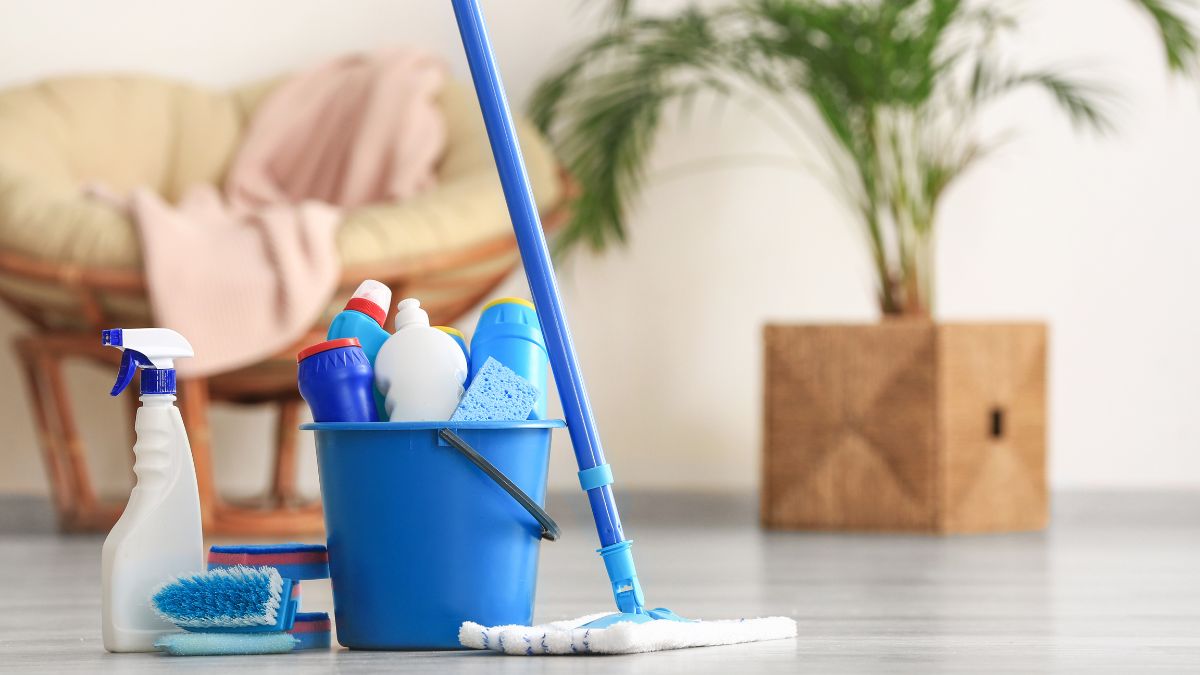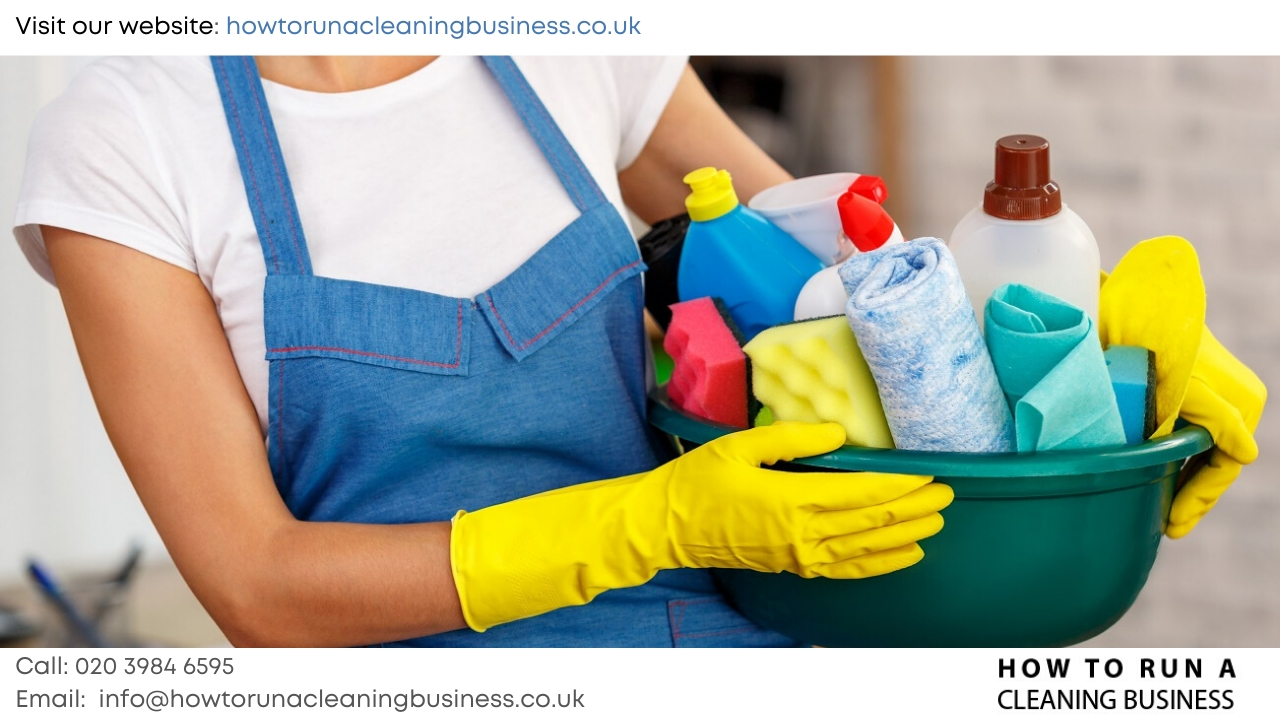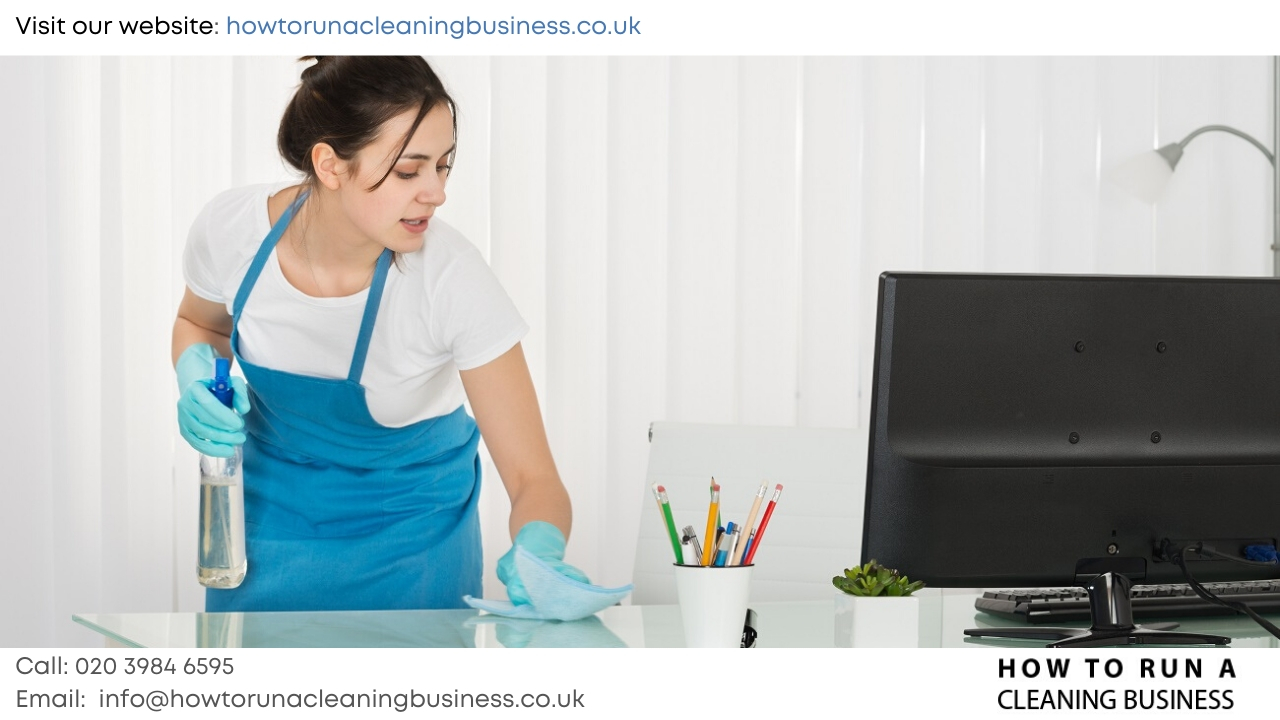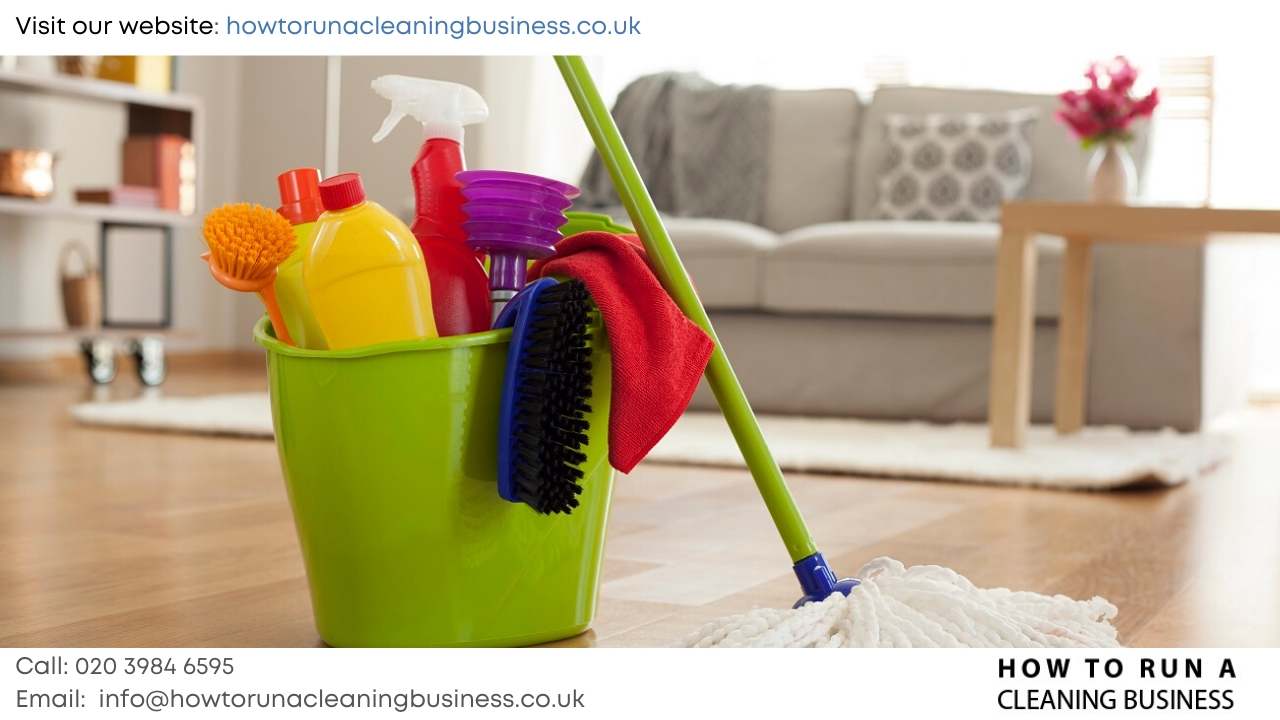How to Choose the Right Business Structure for Your Cleaning Company

Starting a cleaning company is exciting, but choosing the right business structure can significantly impact your business's success. Each structure offers different advantages and drawbacks in terms of liability, taxation, and operational flexibility. In this guide, we'll walk you through the various business structures available in the UK, helping you make an informed decision that aligns with your goals and circumstances.
Understanding Business Structures
Before delving into specifics, it's essential to understand the different business structures you can choose from:
1. Sole Trader A sole trader is the simplest form of business structure, where you run your cleaning business as an individual. You're personally responsible for all aspects of the business, including finances and liabilities.
2. Partnership A partnership involves two or more individuals sharing ownership of the cleaning business. It allows for shared decision-making and resources but also comes with shared liabilities.
3. Limited Liability Partnership (LLP) An LLP offers a middle ground between partnerships and limited companies. It provides limited liability to its partners while allowing them to participate in management.
4. Limited Company (Ltd) A limited company is a distinct and different legal entity from its owners (shareholders). It offers limited liability protection to its shareholders and directors, which means personal assets are protected in case of business debts.
5. Franchise Operating your cleaning business as a franchise involves buying into an established brand and business model. While you benefit from brand recognition and support, you must operate within the franchisor's guidelines.
Sole Trader
Definition and Basic Characteristics - As a sole trader, you operate your cleaning business as an individual, with no legal distinction between the business and yourself. It's the most straightforward and cost-effective way to start a business.
Advantages
- Ease of Setup:Minimal legal formalities and lower startup costs.
- Direct Control: You have full control over business decisions and operations.
- Tax Simplicity: Easier tax reporting compared to other structures.
Disadvantages
- Unlimited Liability:You're personally liable for all business debts and legal obligations.
- Limited Growth Potential: Difficulty in raising capital compared to other structures.
- Risk of Burnout: Sole responsibility for all aspects of the business can lead to burnout.
Partnership
What Constitutes a Partnership in the Cleaning Business?
A partnership involves two or more individuals sharing ownership, responsibilities, and profits of a cleaning company. Partnerships can be general (equal responsibility and liability) or limited (one partner has limited liability).
Benefits
- Shared Responsibility: Decision-making and workload can be shared.
- Diverse Skills: Partners can bring complementary skills and expertise.
- Pooling Resources: Easier access to capital and resources compared to sole traders.
Considerations
- Shared Liability: Partners are jointly and severally liable for business debts and actions of other partners.
- Potential for Disputes: Differences in opinions and decision-making can lead to conflicts.
- Dependency: Dependency on partners for financial and operational decisions.
Limited Liability Partnership (LLP)
Features and Benefits
An LLP provides partners with limited liability protection, meaning their personal assets are safeguarded against business liabilities. It allows partners to participate in management without assuming full personal liability.
Considerations
- Legal Compliance: LLPs must adhere to specific legal requirements and filing obligations.
- Costs: Higher setup and administrative costs compared to sole traderships.
- Perception: Perception of LLPs may vary among clients and stakeholders compared to limited companies.
Limited Company (Ltd)
Overview and Suitability
A limited company is a separate legal entity from its owners, offering limited liability protection to its shareholders and directors. It's the most common structure for medium to large cleaning businesses due to its legal and financial advantages.
Responsibilities and Legal Aspects
- Corporate Governance: Directors must comply with company law and statutory regulations.
- Limited Liability: Shareholders' personal assets are protected in case of business debts.
- Tax Efficiency: Opportunities for tax planning and incentives for growth.
Franchise
Franchise Model for Cleaning Businesses Operating as a franchise allows you to leverage an established brand and business model. You purchase the rights to use the franchisor's brand, products, and operational methods in exchange for fees and royalties.
Advantages
- Brand Recognition: Access to a recognised brand name can attract customers.
- Training and Support: Franchisors often provide training, marketing support, and operational guidance.
- Proven Business Model: Reduced risk with a tested and proven business model.
Disadvantages
- Costs: Initial franchise fees, ongoing royalties, and marketing contributions can be substantial.
- Restrictions: Limited autonomy in business decisions and operations.
- Dependency: Dependence on the franchisor's reputation and success.
Factors Influencing Your Decision
When choosing a business structure for your cleaning company, consider the following factors:
- Legal Liability: How much personal risk are you willing to assume?
- Tax Implications: Which structure offers the most tax advantages for your business?
- Operational Control: How much control do you want over decision-making and
operations?
- Funding and Investment: What are the capital requirements and funding options available to your chosen structure?
- Administrative Responsibilities: What are the ongoing compliance and administrative requirements?
Steps to Choosing the Right Structure
- Evaluate Your Goals: Align the chosen structure with your long-term business objectives.
- Seek Professional Advice: Consult with legal and financial advisors who specialise in business structures.
- Consider Future Growth: Assess the scalability and flexibility of the chosen structure as your business grows.
Key Considerations for Maintenance and Compliance
- Ongoing Compliance: Ensure you understand and meet the legal and regulatory obligations of your chosen structure.
- Financial Management: Maintain accurate financial records and manage tax obligations effectively.
- Adaptability: Review and adapt your business structure as your business evolves and grows.
Conclusion
Choosing the right business structure for your cleaning company is a critical decision that impacts your legal standing, financial obligations, and operational flexibility. By understanding the pros and cons of each structure and evaluating your business needs, you can make an informed choice that sets your cleaning business on the path to success.
FAQ
Is there a minimum capital requirement for setting up a limited company (Ltd) for a cleaning business?
No, there is no specific minimum capital requirement to form a limited company (Ltd) in the UK. You can start with any amount of capital, even as low as £1.
Can a sole trader later change their business structure to a limited company?
Yes, a sole trader can transition to a limited company structure at any time. This process involves registering a new company and transferring business assets and operations accordingly.
What are the potential tax advantages of operating as a limited company (Ltd) compared to a sole trader?
Limited companies often benefit from lower tax rates on profits and more opportunities for tax planning, including allowances for business expenses and dividends.
Explore further business strategies by visiting How to Run a Cleaning Business.
© How to Run a Cleaning Business
How to Choose the Right Business Structure for Your Cleaning Company
Starting a cleaning company is exciting, but choosing the right business structure can significantly impact your business's success. Each structure offers different advantages and drawbacks in terms of liability, taxation, and operational flexibility. In this guide, we'll walk you through the various business structures available in the UK, helping you make an informed decision that aligns with your goals and circumstances.
Understanding Business Structures
Before delving into specifics, it's essential to understand the different business structures you can choose from:
- Sole Trader A sole trader is the simplest form of business structure, where you run your cleaning business as an individual. You're personally responsible for all aspects of the business, including finances and liabilities.
- Partnership A partnership involves two or more individuals sharing ownership of the cleaning business. It allows for shared decision-making and resources but also comes with shared liabilities.
- Limited Liability Partnership (LLP) An LLP offers a middle ground between partnerships and limited companies. It provides limited liability to its partners while allowing them to participate in management.
- Limited Company (Ltd) A limited company is a distinct and different legal entity from its owners (shareholders). It offers limited liability protection to its shareholders and directors, which means personal assets are protected in case of business debts.
- Franchise Operating your cleaning business as a franchise involves buying into an established brand and business model. While you benefit from brand recognition and support, you must operate within the franchisor's guidelines.
Sole Trader
Definition and Basic Characteristics As a sole trader, you operate your cleaning business as an individual, with no legal distinction between the business and yourself. It's the most straightforward and cost-effective way to start a business.
Advantages
- Ease of Setup: Minimal legal formalities and lower startup costs.
- Direct Control: You have full control over business decisions and operations.
- Tax Simplicity: Easier tax reporting compared to other structures.
Disadvantages
- Unlimited Liability: You're personally liable for all business debts and legal obligations.
- Limited Growth Potential: Difficulty in raising capital compared to other structures.
- Risk of Burnout: Sole responsibility for all aspects of the business can lead to burnout.
Partnership
What Constitutes a Partnership in the Cleaning Business?
A partnership involves two or more individuals sharing ownership, responsibilities, and profits of a cleaning company. Partnerships can be general (equal responsibility and liability) or limited (one partner has limited liability).
Benefits
- Shared Responsibility: Decision-making and workload can be shared.
- Diverse Skills: Partners can bring complementary skills and expertise.
- Pooling Resources: Easier access to capital and resources compared to sole traders.
Considerations
- Shared Liability: Partners are jointly and severally liable for business debts and actions of other partners.
- Potential for Disputes: Differences in opinions and decision-making can lead to conflicts.
- Dependency: Dependency on partners for financial and operational decisions.
Limited Liability Partnership (LLP)
Features and Benefits
An LLP provides partners with limited liability protection, meaning their personal assets are safeguarded against business liabilities. It allows partners to participate in management without assuming full personal liability.
Considerations
- Legal Compliance: LLPs must adhere to specific legal requirements and filing obligations.
- Costs: Higher setup and administrative costs compared to sole traderships.
- Perception: Perception of LLPs may vary among clients and stakeholders compared to limited companies.
Limited Company (Ltd)
Overview and Suitability
A limited company is a separate legal entity from its owners, offering limited liability protection to its shareholders and directors. It's the most common structure for medium to large cleaning businesses due to its legal and financial advantages.
Responsibilities and Legal Aspects
- Corporate Governance: Directors must comply with company law and statutory regulations.
- Limited Liability: Shareholders' personal assets are protected in case of business debts.
- Tax Efficiency: Opportunities for tax planning and incentives for growth.
Franchise
Franchise Model for Cleaning Businesses Operating as a franchise allows you to leverage an established brand and business model. You purchase the rights to use the franchisor's brand, products, and operational methods in exchange for fees and royalties.
Advantages
- Brand Recognition: Access to a recognised brand name can attract customers.
- Training and Support: Franchisors often provide training, marketing support, and operational guidance.
- Proven Business Model: Reduced risk with a tested and proven business model.
Disadvantages
- Costs: Initial franchise fees, ongoing royalties, and marketing contributions can be substantial.
Restrictions: Limited autonomy in business decisions and operations.
Dependency: Dependence on the franchisor's reputation and success.
Factors Influencing Your Decision
- When choosing a business structure for your cleaning company, consider the following factors:
Legal Liability: How much personal risk are you willing to assume?
Tax Implications: Which structure offers the most tax advantages for your business?
Operational Control: How much control do you want over decision-making and
operations?
Funding and Investment: What are the capital requirements and funding options available to your chosen structure?
Administrative Responsibilities: What are the ongoing compliance and administrative requirements?
Steps to Choosing the Right Structure
Evaluate Your Goals: Align the chosen structure with your long-term business objectives.- Seek Professional Advice: Consult with legal and financial advisors who specialise in business structures.
- Consider Future Growth: Assess the scalability and flexibility of the chosen structure as your business grows.
Key Considerations for Maintenance and Compliance
- Ongoing Compliance: Ensure you understand and meet the legal and regulatory obligations of your chosen structure.
- Financial Management: Maintain accurate financial records and manage tax obligations effectively.
- Adaptability: Review and adapt your business structure as your business evolves and grows.
Conclusion
Choosing the right business structure for your cleaning company is a critical decision that impacts your legal standing, financial obligations, and operational flexibility. By understanding the pros and cons of each structure and evaluating your business needs, you can make an informed choice that sets your cleaning business on the path to success.
FAQ
Is there a minimum capital requirement for setting up a limited company (Ltd) for a cleaning business?
No, there is no specific minimum capital requirement to form a limited company (Ltd) in the UK. You can start with any amount of capital, even as low as £1.
Can a sole trader later change their business structure to a limited company?
Yes, a sole trader can transition to a limited company structure at any time. This process involves registering a new company and transferring business assets and operations accordingly.
What are the potential tax advantages of operating as a limited company (Ltd) compared to a sole trader?
Limited companies often benefit from lower tax rates on profits and more opportunities for tax planning, including allowances for business expenses and dividends.
5 Steps To Create A Profitable Cleaning Business

Establishing a successful cleaning business is anything but easy, especially with the fierce competition in the cleaning industry today. However, we are happy to inform you that it is not impossible.
Despite the competition, many cleaning businesses have risen to the top and continue to remain afloat. How did they do it? What separates a successful cleaning business from others? What do you need to join this top one percent?
We’ve curated this article to answer these questions and get you started. Keep reading to learn our 5 Steps To Create A Profitable Cleaning Business. Of course, we will leave you with a bonus at the end of the article. So, stay glued.
Choose A Cleaning Niche of Specialisation
To succeed in this business, it is important to understand your strengths and areas of focus. There are tons of cleaning services you can offer but smart business owners know where to draw the line. Take the time to consider each cleaning service. Be sure to study their benefits, drawbacks, available market, and required equipment. This will help you to determine if it is worth adding to your catalogue or not.
Learn To Clean Like A Pro
Most people get into the cleaning industry with the impression that cleaning is easy and simple, forgetting that there is more to cleaning than merely using a vacuum machine. To run a profitable cleaning business, you must follow standard regulatory laws. Both you and your staff must be properly trained to clean like pros, handle cleaning chemicals, and operate multiple cleaning machines.
Get Into Promoting Your Cleaning Business
Marketing is at the centre of every successful business, irrespective of the industry. This is true for cleaning businesses too. Don’t be cajoled to think you don’t need marketing. In fact, you need it more due to the increasing number of competitors.
Learn to advertise your services by connecting with both people and real estate agents in your community. Basically, any avenue to help you get the word out there. You can go as far as offering discounts and employing other marketing tricks to attract potential customers.
As always, we need your love to grow this channel. Please remember to like, share and subscribe to our channel to help us keep sending you useful tips like this.
Create A One-Of-A-Kind Service Model
Customer service always comes first for any business to be successful. Create an excellent relationship with your customers and you will enjoy an increasing pool of loyal and happy customers. To do this, make sure you have an excellent and flexible service model and work on every customer’s feedback.
Recruit A Passionate Cleaning Crew
The staff is critical to creating a profitable cleaning business. The wrong staff can wreck your business by doing a lousy job. But with the right team, you will find your business soaring to the top of the food chain. Therefore, you ought to handle the hiring process meticulously. Endeavour to hire employees who are enthusiastic about their work and be sure to invest time to train them.
Bonus tip
Control Your Company's Overall Activities
As your business grows, be certain to build a sound business plan that will help you create a workable structure and hire financial specialists to help you arrange your money, including payrolls for your employees and taxes, so you don't get shut down by the government. Most importantly, be willing to have both yourself and your business insured in order to avoid having claims that could bankrupt your company.
The cleaning industry is a very lucrative business but it takes an expert to recognize the goldmine in the industry. We are positive these expert tips will help you create a profitable cleaning business. Good luck!
For professional assistance, don’t hesitate to contact How to Run a Cleaning Business. We are here to help!
© How to Run a Cleaning Business
5 Importance of Online Reviews for Your Cleaning Business

Running a business is not the same as in the past decade. Correctly maximising the power of online reviews can help you grow your cleaning business significantly. How? Keep reading to find out!
Most small businesses often overlook the power of online reviews. Many small businesses don’t bother to ask for reviews. They probably think it is not necessary. Well, nothing could be wrong.
Reviews are one of the best marketing strategies for any business that wants to stay competitive in this modern market. Since competition is on the rise in janitorial services, reviews can help you stand out and give you an edge over your competitors.
Not convinced yet? Well, take a look at some of the importance of online reviews. Stay glued! We will leave you with a bonus tip at the end.
- It builds trust
We say online reviews are virtually the first thing most visitors will look out for when they visit a website. Irrespective of the captivating things you put up on your website, prospects will believe just one good online review over them all. Yes, if you do not already know, people will not trust you until you prove yourself trustworthy. And the only way to do that is to let your past projects speak for themselves via reviews.
- It is a sales booster
After you successfully get a prospect to trust you, what next? You guessed right. You will be on your way to signing a contract sooner than later. Online review is essential because it helps win clients over without you even trying. Good reviews from satisfied clients are far more effective in attracting more clients than several forms of advertisement you invest in.
- It supports improvement
This is the part you may not like to hear. But it is essential you know this. Once you create a platform to receive reviews, rest assured that you will not only get good reviews but bad reviews as well.
Good reviews only come from satisfied customers. This, therefore, means that unsatisfied customers will leave bad reviews. Nonetheless, here is the good news. Unsatisfied customers will express why they didn’t like your services. You will see things like they weren’t punctual, poor customer service, and whatnot. Now, you can take up these reviews, work on yourself and your team, and see to it that you improve on the areas of complaints.
- It boosts SEO ranking
Every business wants to be on the first page of search engines like Google. Therefore, they are working hard to create nice content. Many people fail to realise that reviews are a great way to boost your SEO ranking, too.
You already know that content is essential for your SEO ranking and that Google counts reviews as content. Yes, your customers are content creators. These contents from customers will most likely contain keywords about your business, which will add to your SEO efforts and improve your visibility online. Here is how.
- Encourage interaction
Another importance of online reviews that cannot be overlooked is the interaction platform it gives. Customers like it when they can interact with the company they are dealing with. It makes them feel valued. And having a review section on your website will enable smooth interactions with your clients.
Bonus tip
- It allows photo-sharing
Creating a platform for clients to leave a review will allow them to share before-and-after photos of your past projects. This way, prospects can know what to expect and even make you more credible in their eyes.
Get your clients to leave a review for you on your site. Do not think it will be problematic for them. No, most satisfied clients are happy to leave a review. Your job is to ensure they are happy, and they will gladly leave a good review for you. For more assistance, contact us at How to Run a Cleaning Business. We are here to help.
© How to Run a Cleaning Business
5 Practical Approaches To Reduce Staff Turnover In Your Cleaning

Virtually every cleaning business owner seeks to reduce staff turnover to ensure a steady business, delighted customers, and annual gains. Unfortunately, not everyone is aware that happy consumers start with happy staff.
In far too many scenarios, a new cleaner may be a blessing or a burden. This is quite unfortunate news for the cleaning industry, which in most cases, employs its entire cleaning staff multiple times a year. And employment generally requires recruiting and training, which can be somewhat expensive. This makes it important to know how to retain cleaning staff.
Implementing practical approaches to reduce cleaners’ turnover not only saves money, but also keeps your business running smoothly, organises your operations, and strengthens client loyalty. Here are 5 Practical Approaches To Reduce Staff Turnover In Your Cleaning Business. Of course, we will leave you with a bonus at the end of the article. So, stay glued. Also, as we proceed, please click on Subscribe if you haven’t done that already. Now, let’s dive in!
Pick The Best Cleaner For The Job
It's never simple to find the proper cleaner. It's critical to find and recruit cleaners who are willing to learn, capable of thriving in their roles, and unlikely to quit anytime soon.
Hire people who want to work in the cleaning industry as a career, not just as a stopgap until they can find something more suitable. Inquire about a prospective cleaner's long-term goals, interests, and motives for needing to apply to see whether they want to learn and develop with your cleaning company or not.
Deliver an Outstanding Training Session
This is a key strategy to reduce staff turnover since it provides new hires with training to discover individuals who not only do their jobs better and faster but also love them. Using training manuals and hands-on training sessions, employees may learn new skills. As a result, they can advance in their jobs and receive greater pay.
Communicate Effectively
Communicating with your cleaners is a fantastic strategy for not only maintaining them but also enhancing the work environment, as it frequently leads to strong ties.
You don't have to provide every detail about your business, but you should be willing to provide as much information as possible. Open communication, in which you may offer and receive comments and criticism, can help you accomplish positive results. An open-door policy can sometimes be helpful since it enables cleaners to get training and build trust.
Create Flexible Work Schedules
Thanking your cleaners with staff parties, picnics, or a family bowling night are all excellent ideas. This makes your cleaners feel like they are a part of your cleaning business by instilling a sense of togetherness in them.
Also, allow for schedule flexibility. This can take a variety of forms including four-day workweeks, flexible work hours, and so on. Having a daycare on site might also be a good idea. Your cleaners will sleep better, have more energy, and be healthier overall as a result of these working habits.
Evaluate Overall Performance
Evaluate each cleaner's performance regularly. When cleaners go above and beyond their typical job responsibilities, give them praise and support. Willing to work overtime, taking on tough cleaning tasks, responding to last-minute cleaning tasks, and offering to work midnight shifts are all instances of this.
Encourage cleaners to learn from their mistakes by providing constructive feedback. Also, focus on providing cleaners with advanced training or counselling so they don't make further mistakes. This will undoubtedly reduce staff turnover in your cleaning business.
Hold Exit Interviews
Although cleaners may quit for a variety of reasons, when they do quit, an exit interview is a fantastic way to discover more about their reasons for leaving.
If they are departing because they are unhappy, completely ignoring these concerns will raise greater and more serious concerns within your staff. We encourage interviewing a member of the management team who is liked by the cleaners. This makes it possible to give more sincere and honest responses.
Because cleaners are frequently disregarded and despised by customers, approaching them with care, empathy, and respect may be the most effective method to reduce staff turnover. This will very well establish a distinction between your business and other businesses.
© How to Run a Cleaning Business
Mistakes Cleaning Companies Often Make

Hypothetically speaking, you have made up your mind to start a cleaning business. You are fired up and ready to go; with the right positivity and mindset, you will do a great job. So you go ahead and register the business, get your insurance plans, advertise, and all. You have a great idea of how to make the business a success from the start. Then, suddenly, things are not going that great anymore. Have you stopped to consider that there may be some things you are not getting right in your business? Knowing these things and trying to find a way around it might be what you need to save yourself some time, money, and even your business reputation. You do not need to do trial and error in this business of cleaning, or things may even get worse along the line.
Without further ado, let us jump straight into how one can run a cleaning business, discussing some of those pitfalls that some people do not know and others seem to neglect.
Not coming up with a marketing and business plan: Remember how we discussed that you might be fired up and ready to go? Well, making a cleaning business profitable will require more than a hardworking owner, the ability to deep clean, and a good attitude to work. A saying goes, "If you fail to plan, you plan to fail." This phrase has stood the test of time as it is true. Start with a mission statement to help guide you and clarify the purpose of your business. Then, proceed to draft out a good business plan.
This plan should contain a total review of your business, operation plans, products and services, market analysis, and strategies for marketing and sales.
Not building a professional website: The world has gone digital, and it is only wise that we all go with it. Having a professional website has become a key component of any successful business. With a website, you are always at work. It can be made to provide valuable information to clients and customers, add a bit of authority and professionalism, and even help you capture leads.
Some of the details of the website would be contact forms, information about the business, any special deals and regular sale prices, and also a blog. With optimized blog posts, your website can rank higher in searches, strengthening your online presence and giving you an edge over your competition. Also, prompt, courteous, and regular interaction with those that contact you online is important to create a good first impression for you and your business.
Not charging the right prices: This is one of the commonest mistakes most cleaning businesses make, and it is a big factor that should be considered. You are in the business to make a profit, right? So why undercharge for your professional cleaning services? It is understandable when you undercharge at the beginning in a bid to build your clientele list, but if you continue going that way, it could cut your profits considerably, and this would not mean well for your business.
Part of the business plan would be to take a minute and come up with prices for all your services. A careful thought process of pricing is much better than just pulling random figures from your head or trying to undercharge just to beat the competition. Instead of lowering prices to beat them, improve on your quality. You stand a better chance that way.
Not diversifying services rendered: Well, the cleaning business is becoming more competitive by the second. This means you need to stay ahead of the competition. One way to do that would be to diversify the services you render. Some cleaning businesses choose to stick with maintenance and deep cleaning regularly. However, that may be the difference between profit and loss. Offer a wider range of services to customers, and you will be able to meet increasing demand. Services to be rendered are numerous, but take it slow to avoid being 'Jack of all trades.'
In the end, knowing how to run a business is not as easy as it seems. However, when you know your problems, they are already half-solved. To know the problems associated with cleaning services, follow the solutions listed above, and you are good to go.
© How to Run a Cleaning Business
8 Factors for Choosing a Cleaning Company

When it comes to cleaning, you know well enough that it can be an overwhelming task. From mopping to dusting and vacuuming, there is a whole lot of cleaning chores that demand attention daily.
We struggle to tackle our schedules even without cleaning on them, so what is left to do when we postpone one cleaning task after another? The logical solution to this conundrum is to hire a cleaning company. There are quite a lot of them out there and it is important to do your research before you contact one and give them the go-ahead. There are a few key factors to aid you in your choice:
- References – is there anyone you know that has worked with a cleaning company before? Ask them for their input. Co-workers, family members, neighbours and friends can be a valuable source of information for getting the right cleaning company for yourself. Having someone to vouch for this or that company can be all the proof you need that they are a good pick for your needs.
- Training – you don’t want amateurs cleaning for you, especially if that task is a more complex one. An experienced company means one that has been in the industry for some time and provides ongoing training for their employees. You should ask about this when you first get in touch with a cleaning company.
- Certifications – having the right certifications can be another important step to securing the best service. Ask for this when you contact them. A good company will have taken the time to acquire this because it provides an edge over the competition and gives you peace of mind that the cleaners know what they are doing.
- Insurance – another important factor for booking a cleaning company is insurance. A commercial company needs to be fully insured, to work for you. That way they will guarantee the safety and security of your home, company and the people they send to work for them.
- Availability – a good company knows how to make available cleaners on relatively short notice. You cannot expect miracles in the form of immediate response, but they should at least provide you with an estimate of when they are available in a short time. Even when the job is a big one, they should be able to muster a team and provide a quote within a reasonable time.
- Accountability – is there a way for them to measure the success of their cleaners? What about the feedback that you will provide? They must also have a formal procedure in case of complaints from your side. All of these things amount to accountability, which is an important factor to consider for every cleaning company you consider working with.
- Green cleaning procedures – nowadays, it is important for cleaning companies to employ green methods for doing their work. This means using eco-friendly solutions and methods that are safe for the environment and people. Make sure to ask about this when you contact the company and see to it that they employ such means when they work for you.
- Flexible programs – when your needs change, you want to be sure that the cleaning company can react and provide a new plan for cleaning. After all, if they are not flexible, you will hardly use them for long. Enquire more about any add-on services that you can count on.
All of these are important factors for hiring and working with a cleaning company. Make sure you pay attention to all of them if you wish to have the best experience.
© How to Run a Cleaning Business
